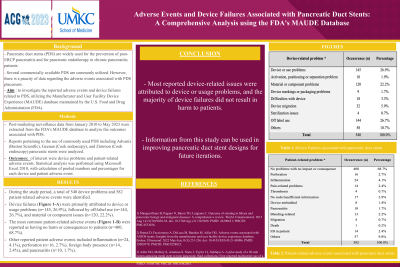Sunday Poster Session
Category: Biliary/Pancreas
P0003 - Adverse Events and Device Failures Associated With Pancreatic Stents: A Comprehensive Analysis Using the FDA's MAUDE Database
Sunday, October 22, 2023
3:30 PM - 7:00 PM PT
Location: Exhibit Hall


Fouad Jaber, MD
University of Missouri-Kansas City
Kansas City, MO
Presenting Author(s)
Fouad Jaber, MD1, Saqr Alsakarneh, MD1, Mohammad Jaber, MD2, Khalid K. Ahmed, MD3, Azizullah Beran, MD4, Khaled Elfert, MD5, Ahmed Salih, MD6, Manasik Abdu, MD7, Yazan Abboud, MD8, Zubair Khan, MD9, Mohamed Ismail, DO8, Joseph Sleiman, MD10, Mohamed Abdallah, MD11, Ala Abdel-Jalil, MD12, Mohammad Bilal, MD13
1University of Missouri-Kansas City, Kansas City, MO; 2Al-Azhar University, Gaza, Palestinian Territories; 3The Wright Center for GME, Scranton, PA; 4Indiana University, Indianapolis, IN; 5SBH Health System, Bronx, NY; 6Indiana University School of Medicine, Muncie, IN; 7University at Buffalo-Catholic Health System, Buffalo, NY; 8Rutgers New Jersey Medical School, Newark, NJ; 9Mercy Clinic, Poland, OH; 10UPMC Presbyterian, Pittsburgh, PA; 11University of Minnesota Medical Center, Minneapolis, MN; 12Cleveland Clinic Foundation, Cleveland, OH; 13Minneapolis VA Medical Center, Minneapolis, MN
Introduction: Pancreatic duct stents (PDS) are widely used for the prevention of post-ERCP pancreatitis and for pancreatic endotherapy in chronic pancreatitis patients. Several commercially available PDS are commonly utilized. However, there is a paucity of data regarding the adverse events associated with PDS placement. This study aims to investigate the reported adverse events and device failures related to PDS, utilizing the Manufacturer and User Facility Device Experience (MAUDE) database maintained by the U.S. Food and Drug Administration (FDA).
Methods: Post-marketing surveillance data from January 2010 to May 2023 were extracted from the FDA's MAUDE database to analyze the outcomes associated with PDS. Reports pertaining to the use of commonly used PDS including Advanix (Boston Scientfic), Geenan (Cook endoscopy), and Zimmon (Cook endoscopy) pancreatic stents were analyzed. The primary outcomes of interest were device problems and patient-related adverse events. Statistical analysis was performed using Microsoft Excel 2010, with calculation of pooled numbers and percentages for each device and patient adverse event.
Results: During the study period, a total of 540 device problems and 582 patient-related adverse events were identified. Device failures (
Figure 1-A) were primarily attributed to device or usage problems (n=145, 26.9%), followed by off-label use (n=144, 26.7%), and material or component issues (n=120, 22.2%). The most common patient-related adverse events (Figure 1-B) were reported as having no harm or consequences to patients (n=400, 68.7%). Other reported patient adverse events included inflammation (n=24, 4.1%), perforation (n=16, 2.7%), foreign body presence (n=14, 2.4%), and pancreatitis (n=10, 1.7%). The highest number of device failures was associated with Zimmon pancreatic stents (n=217, 40.2%), followed by Geenen pancreatic stents (n=216, 40%) and Advanix (n=107, 19.8%). Device or usage problems were most frequently reported with the use of Zimmon stents (n=79, 36.4%), followed by Geenen stents (n=60, 27.8%).
Discussion: Most reported device-related issues were attributed to device or usage problems, and the majority of device failures did not result in harm to patients. Information from this study can be used in improving pancreatic duct stent designs for future iterations.

Disclosures:
Fouad Jaber, MD1, Saqr Alsakarneh, MD1, Mohammad Jaber, MD2, Khalid K. Ahmed, MD3, Azizullah Beran, MD4, Khaled Elfert, MD5, Ahmed Salih, MD6, Manasik Abdu, MD7, Yazan Abboud, MD8, Zubair Khan, MD9, Mohamed Ismail, DO8, Joseph Sleiman, MD10, Mohamed Abdallah, MD11, Ala Abdel-Jalil, MD12, Mohammad Bilal, MD13. P0003 - Adverse Events and Device Failures Associated With Pancreatic Stents: A Comprehensive Analysis Using the FDA's MAUDE Database, ACG 2023 Annual Scientific Meeting Abstracts. Vancouver, BC, Canada: American College of Gastroenterology.
1University of Missouri-Kansas City, Kansas City, MO; 2Al-Azhar University, Gaza, Palestinian Territories; 3The Wright Center for GME, Scranton, PA; 4Indiana University, Indianapolis, IN; 5SBH Health System, Bronx, NY; 6Indiana University School of Medicine, Muncie, IN; 7University at Buffalo-Catholic Health System, Buffalo, NY; 8Rutgers New Jersey Medical School, Newark, NJ; 9Mercy Clinic, Poland, OH; 10UPMC Presbyterian, Pittsburgh, PA; 11University of Minnesota Medical Center, Minneapolis, MN; 12Cleveland Clinic Foundation, Cleveland, OH; 13Minneapolis VA Medical Center, Minneapolis, MN
Introduction: Pancreatic duct stents (PDS) are widely used for the prevention of post-ERCP pancreatitis and for pancreatic endotherapy in chronic pancreatitis patients. Several commercially available PDS are commonly utilized. However, there is a paucity of data regarding the adverse events associated with PDS placement. This study aims to investigate the reported adverse events and device failures related to PDS, utilizing the Manufacturer and User Facility Device Experience (MAUDE) database maintained by the U.S. Food and Drug Administration (FDA).
Methods: Post-marketing surveillance data from January 2010 to May 2023 were extracted from the FDA's MAUDE database to analyze the outcomes associated with PDS. Reports pertaining to the use of commonly used PDS including Advanix (Boston Scientfic), Geenan (Cook endoscopy), and Zimmon (Cook endoscopy) pancreatic stents were analyzed. The primary outcomes of interest were device problems and patient-related adverse events. Statistical analysis was performed using Microsoft Excel 2010, with calculation of pooled numbers and percentages for each device and patient adverse event.
Results: During the study period, a total of 540 device problems and 582 patient-related adverse events were identified. Device failures (
Figure 1-A) were primarily attributed to device or usage problems (n=145, 26.9%), followed by off-label use (n=144, 26.7%), and material or component issues (n=120, 22.2%). The most common patient-related adverse events (Figure 1-B) were reported as having no harm or consequences to patients (n=400, 68.7%). Other reported patient adverse events included inflammation (n=24, 4.1%), perforation (n=16, 2.7%), foreign body presence (n=14, 2.4%), and pancreatitis (n=10, 1.7%). The highest number of device failures was associated with Zimmon pancreatic stents (n=217, 40.2%), followed by Geenen pancreatic stents (n=216, 40%) and Advanix (n=107, 19.8%). Device or usage problems were most frequently reported with the use of Zimmon stents (n=79, 36.4%), followed by Geenen stents (n=60, 27.8%).
Discussion: Most reported device-related issues were attributed to device or usage problems, and the majority of device failures did not result in harm to patients. Information from this study can be used in improving pancreatic duct stent designs for future iterations.

Figure: Figure 1-A: Device Failures associated with pancreatic stents.
Figure 1-B: Patient-related adverse Events associated with pancreatic stents.
Device or Use Problems (Adverse Event Without Identified Device or Use Problem, no apparent adverse events, Use of Device Problem, Improper or Incorrect Procedure or Method, Device Operates Differently Than Expected), Activation, Positioning or Separation Problem (Activation Failure, Activation, Difficult or Delayed Positioning, Positioning or Separation Problem, Positioning Failure, Positioning Problem), Material or Component Problems (Break, Material Deformation, Material Integrity Problem, Material Puncture/Hole, defective device, component failing, fracture), Device Markings or Packaging Problems (Device Markings/Labelling Problem, Device Packaging ), Difficulties with Device (Difficult to Advance, Difficult to Remove, Device Difficult to Setup or Prepare, failure to advance), Migration (Migration or Expulsion of Device, Migration, Detachment of Device or Device Component ), Sterilization (Problem with sterilization , Contamination /Decontamination Problem), Others ( Entrapment of Device, Retraction Problem; Stretched, off label use, biocompatibility, fluid/blood leakage, appropriate code not available, insufficient information, obstruction of flow, leak/splash)Pain related (Abdominal pain/pain/implant pain) , Bleeding-related (Bleeding/hemorrhage, blood
Figure 1-B: Patient-related adverse Events associated with pancreatic stents.
Device or Use Problems (Adverse Event Without Identified Device or Use Problem, no apparent adverse events, Use of Device Problem, Improper or Incorrect Procedure or Method, Device Operates Differently Than Expected), Activation, Positioning or Separation Problem (Activation Failure, Activation, Difficult or Delayed Positioning, Positioning or Separation Problem, Positioning Failure, Positioning Problem), Material or Component Problems (Break, Material Deformation, Material Integrity Problem, Material Puncture/Hole, defective device, component failing, fracture), Device Markings or Packaging Problems (Device Markings/Labelling Problem, Device Packaging ), Difficulties with Device (Difficult to Advance, Difficult to Remove, Device Difficult to Setup or Prepare, failure to advance), Migration (Migration or Expulsion of Device, Migration, Detachment of Device or Device Component ), Sterilization (Problem with sterilization , Contamination /Decontamination Problem), Others ( Entrapment of Device, Retraction Problem; Stretched, off label use, biocompatibility, fluid/blood leakage, appropriate code not available, insufficient information, obstruction of flow, leak/splash)Pain related (Abdominal pain/pain/implant pain) , Bleeding-related (Bleeding/hemorrhage, blood
Disclosures:
Fouad Jaber indicated no relevant financial relationships.
Saqr Alsakarneh indicated no relevant financial relationships.
Mohammad Jaber indicated no relevant financial relationships.
Khalid Ahmed indicated no relevant financial relationships.
Azizullah Beran indicated no relevant financial relationships.
Khaled Elfert indicated no relevant financial relationships.
Ahmed Salih indicated no relevant financial relationships.
Manasik Abdu indicated no relevant financial relationships.
Yazan Abboud indicated no relevant financial relationships.
Zubair Khan indicated no relevant financial relationships.
Mohamed Ismail indicated no relevant financial relationships.
Joseph Sleiman indicated no relevant financial relationships.
Mohamed Abdallah indicated no relevant financial relationships.
Ala Abdel-Jalil indicated no relevant financial relationships.
Mohammad Bilal: Boston Scientific – Consultant.
Fouad Jaber, MD1, Saqr Alsakarneh, MD1, Mohammad Jaber, MD2, Khalid K. Ahmed, MD3, Azizullah Beran, MD4, Khaled Elfert, MD5, Ahmed Salih, MD6, Manasik Abdu, MD7, Yazan Abboud, MD8, Zubair Khan, MD9, Mohamed Ismail, DO8, Joseph Sleiman, MD10, Mohamed Abdallah, MD11, Ala Abdel-Jalil, MD12, Mohammad Bilal, MD13. P0003 - Adverse Events and Device Failures Associated With Pancreatic Stents: A Comprehensive Analysis Using the FDA's MAUDE Database, ACG 2023 Annual Scientific Meeting Abstracts. Vancouver, BC, Canada: American College of Gastroenterology.
